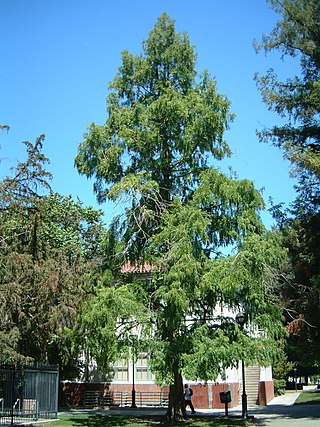
Royal Botanic Gardens, Kew is a non-departmental public body in the United Kingdom sponsored by the Department for Environment, Food and Rural Affairs. An internationally important botanical research and education institution, it employs 1,100 staff. Its board of trustees is chaired by Dame Amelia Fawcett.

Boyce Thompson Arboretum is the oldest and largest botanical garden in the state of Arizona. It is one of the oldest botanical institutions west of the Mississippi River. Founded in 1924 as a desert plant research facility and “living museum”, the arboretum is located in the Sonoran Desert on 392 acres (159 ha) along Queen Creek and beneath the towering volcanic remnant, Picketpost Mountain. Boyce Thompson Arboretum is on U.S. Highway 60, an hour's drive east from Phoenix and 3 miles (4.8 km) west of Superior, Arizona.

Metasequoia glyptostroboides, the dawn redwood, is a fast-growing, endangered deciduous conifer. It is the sole living species of the genus Metasequoia, one of three genera in the subfamily Sequoioideae of the family Cupressaceae. It now survives in the wild only in wet lower slopes and montane river and stream valleys in the border region of Hubei and Hunan provinces and Chongqing municipality in south-central China, notably in Lichuan county in Hubei. Although the shortest of the redwoods, it can grow to 167 ft (51 m) in height.

An arboretum is a botanical collection composed exclusively of trees and shrubs of a variety of species. Originally mostly created as a section in a larger garden or park for specimens of mostly non-local species, many modern arboreta are in botanical gardens as living collections of woody plants and are intended at least in part for scientific study.

The San Francisco Botanical Garden at Strybing Arboretum is located in San Francisco's Golden Gate Park. Its 55 acres represents nearly 9,000 different kinds of plants from around the world, with particular focus on Magnolia species, high elevation palms, conifers, and cloud forest species from Central America, South America and Southeast Asia.
The Royal Botanical Gardens (RBG) is a heritage-listed botanical garden located in the cities of Burlington and Hamilton in Ontario, Canada. It covers extensive environmentally protected areas, historic sites, and culturally relevant gardens from Burlington to Hamilton. It is one of the major tourist attractions between Niagara Falls and Toronto, as well as being a significant local and regional horticultural, education, conservation, and scientific resource.

The United States National Arboretum is an arboretum in northeast Washington, D.C., operated by the United States Department of Agriculture's Agricultural Research Service. It was established in 1927 by an act of Congress after a campaign by USDA Chief Botanist Frederick Vernon Coville.

The Guam rail, known locally and in Chamorro as ko'ko', is a small, terrestrial bird endemic to Guam in the Rallidae family. They are one of the island's few remaining endemic bird species. The species became extinct in the wild in the early 1980s when biologists captured the remaining wild population to establish a breeding program. They have since been successfully introduced to the nearby Rota and Cocos islands. In 2019, they became the second bird species to be reclassified by the International Union for the Conservation of Nature from Extinct in the Wild to Critically Endangered.

Arboretum and Botanical Garden at Cal State Fullerton is a 26-acre (11 ha) botanical garden with a collection of plants from around the world, located on the northeast corner of the California State University, Fullerton campus in Fullerton, California, in the United States. It is the largest botanical garden in Orange County, California with a collection of over 4,000 plants. The Arboretum saves species that are extinct or near extinction and serves as a learning place for agricultural history.

Red Butte Garden and Arboretum consists of a botanical garden, arboretum, and amphitheatre operated by the University of Utah, in the foothills of the Wasatch Range in Salt Lake City, Utah, United States. It is open year-round to the public. Red Butte Garden contains over 100 acres (0.40 km2) of botanical gardens and several miles of hiking trails through native vegetation. Red Butte Creek runs within the northern part of the garden.

The Morton Arboretum, in Lisle, Illinois, United States, is a public garden and outdoor museum with a library, herbarium, and program in tree research including the Center for Tree Science. Its grounds, covering 1,700 acres, include cataloged collections of trees and other living plants, gardens, and restored areas, among which is a restored tallgrass prairie. The living collections include more than 4,100 different plant species. There are more than 200,000 cataloged plants.

The State Botanical Garden of Georgia is a botanical garden of 323 acres in the United States, with a conservatory operated by the University of Georgia. It is located at 2450 South Milledge Avenue, Athens, Georgia.

Elmer Drew Merrill was an American botanist and taxonomist. He spent more than twenty years in the Philippines where he became a recognized authority on the flora of the Asia-Pacific region. Through the course of his career he authored nearly 500 publications, described approximately 3,000 new plant species, and amassed over one million herbarium specimens. In addition to his scientific work he was an accomplished administrator, college dean, university professor and editor of scientific journals.

The North Carolina Botanical Garden is a botanical garden operated by the University of North Carolina at Chapel Hill in Chapel Hill, North Carolina. The primary goal of the Garden is to research, catalog, and promote the native plant species of North Carolina.

The 'dwarf' elm cultivar Ulmus 'Jacqueline Hillier' ('JH') is an elm of uncertain origin. It was cloned from a specimen found in a private garden in Selly Park, Birmingham, England, in 1966. The garden's owner told Hillier that it might have been introduced from outside the country by a relative. Hillier at first conjectured U. minor, as did Heybroek (2009). Identical-looking elm cultivars in Russia are labelled forms of Siberian Elm, Ulmus pumila, which is known to produce 'JH'-type long shoots. Melville considered 'JH' a hybrid cultivar from the 'Elegantissima' group of Ulmus × hollandica. Uncertainty about its parentage has led most nurserymen to list the tree simply as Ulmus 'Jacqueline Hillier'. 'JH' is not known to produce flowers and samarae, or root suckers.

Ulmus parvifolia, commonly known as the Chinese elm or lacebark elm, is a species native to eastern Asia, including China, India, Japan, Korea, and Vietnam. It has been described as "one of the most splendid elms, having the poise of a graceful Nothofagus".
The Cedar Valley Arboretum and Botanic Gardens was founded in 1996 and is located directly East of Hawkeye Community College in Waterloo, Iowa. The mission of the Arboretum is to enhance the quality of life for all individuals through horticulture. The vision of the Arboretum is to serve as a compelling public resource for the study of plants, a leader in environmental stewardship, a cultural center for the community, and a showcase of Iowa's rich heritage with the land. The Arboretum is a 501(c)(3) non-profit, independent organization and supported by its volunteer base and community support.















